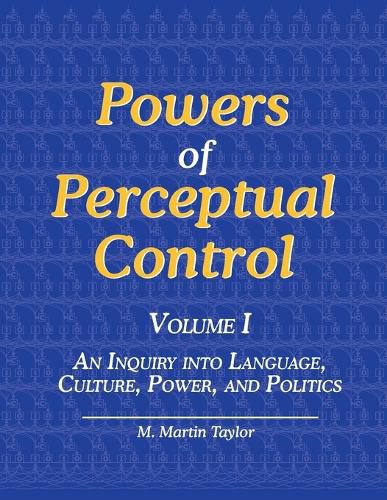Powers of Perceptual Control, Volume I
M Martin Taylor

Powers of Perceptual Control, Volume I
M Martin Taylor
This title is printed to order. This book may have been self-published. If so, we cannot guarantee the quality of the content. In the main most books will have gone through the editing process however some may not. We therefore suggest that you be aware of this before ordering this book. If in doubt check either the author or publisher’s details as we are unable to accept any returns unless they are faulty. Please contact us if you have any questions.
The central principle of Einstein's two Theories of Relativity is that all anyone knows or can know about the universe is what they perceive for themselves. This is also the central principle of Perceptual Control Theory (PCT), the science of how living things of all kinds function individually and socially. PCT replaces determinism by the environment with determination by internal purposes and shows how we rather than the environment are in control.
All living things have needs and preferences and all intentional behavior is the control of perceptions accordingly.
PCT opens a way to unify the 'hard' and 'soft' sciences without reductionism. The basic mathematics of hierarchical cascades of feedback control (with endogenous 'setpoints') are much simpler than the mathematics of relativity, but equally revolutionary, with astonishingly broad application across the physical, biological, and social sciences. These principles, in all their simplicity and elegance, have cross-disciplinary consequences and corollaries which we are only beginning to discover.
Powers of Perceptual Control is an inquiry into these ramifications. Each conceptual development in the book opens lines for observational investigation and experimental test by subject specialists. Control systems are subject to mathematical properties common to all physical systems (thermodynamics, information, complexity, rattling and crumpling). Understanding the limits and capacities of control systems opens lines of investigation that might not otherwise have been considered. It is important also to know when a proposal is unworkable and to understand why. The alternative to this exploration is mere ignorance.
Taylor writes feelingly of a "hope to develop a foundation of PCT-literate members of the general public who might thereby be able to avoid political extremism and to counter it when it arises." A public understanding of control - that what we see people do every day is individuals controlling their own perceptions - and the social consequences of this understanding, can result in wiser collective control of the social, cultural, and environmental realities which we thereby create and maintain. A greater capacity for purposeful participation may be necessary to our survival as a species.
It may take centuries to develop PCT to its full potential. The field is far more vast than any one of us can fully know.
This encyclopedic survey of linkages and dependencies between mathematics, the hard sciences, and the 'squishier' sciences of biology, psychology, sociology and beyond will be an indispensable reference for generations of students and researchers.
This item is not currently in-stock. It can be ordered online and is expected to ship in 7-14 days
Our stock data is updated periodically, and availability may change throughout the day for in-demand items. Please call the relevant shop for the most current stock information. Prices are subject to change without notice.
Sign in or become a Readings Member to add this title to a wishlist.


